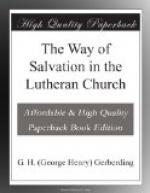When we therefore hear the declaration of absolution from God’s Word, let us believe it, “even as if it were a voice sounding from heaven.”
And therefore the Augsburg Confession, Art. XXV, says that “On account of the very great benefit of Absolution, as well as for other uses to the conscience, Confession is retained among us.”
Such evangelical Confession and Absolution establishes and maintains the true relation that should exist between an evangelical pastor and the members of his flock. Instead of a mere preacher, a platform orator, he becomes a true spiritual guide, a curate for the cure of souls. He encourages his members to reveal to him their weaknesses, their besetting sins, their doubts and spiritual conflicts, in order that he may instruct, direct, comfort and strengthen them with the all-sufficient and powerful Word of God.
And thus, wherever he finds true penitence and faith, however weak, he carries out the divine commission which directs him: “Comfort ye, comfort ye my people, saith the Lord, speak ye comfortably to—i.e. speak ye to the heart of—Jerusalem, and cry unto her that her warfare is accomplished, that her iniquity is pardoned; for she hath received of the Lord’s hand double for all her sins” Is. 40, I, 2.
“How beauteous
are their feet,
Who
stand on Zion’s Hill!
Who bring salvation
on their tongues,
And
Words of peace reveal.
“How charming is their voice!
How sweet the tidings are!
’Zion behold thy Saviour King;
He reigns and triumphs here.’”
CHAPTER XVII.
THE WORD AS A MEANS OF GRACE
In the last chapter we learned that the Word of God is the key of the kingdom, which key Christ has given to His Church, and that this Word, declared by the pastor, does really convey and apply the forgiveness of sins to the penitent and believing. Following out this idea, we wish now to show that God’s Word is the power and effective means through which the Holy Spirit operates on the minds and hearts of the children of men.
The popular idea in regard to the use of the Word, seems to be that it is intended merely as a book of instruction and a guide—that its purpose is merely to tell us about sin and salvation; that like a guide-post it points out the way of salvation, and shows the necessity of repentance, faith, and holiness. That it tells about the need of the Holy Spirit to effect a change of heart, and that further than this it affords no help for fallen man. A poor sinner goes to that Word. He reads it, or hears it preached. He learns indeed that he is a sinner, but he has no deliverance from sin. He learns of Christ’s redemption, but its benefits are not applied to him. He sees that he must repent and believe, but by his own reason and strength he cannot. He learns further, that he needs the




